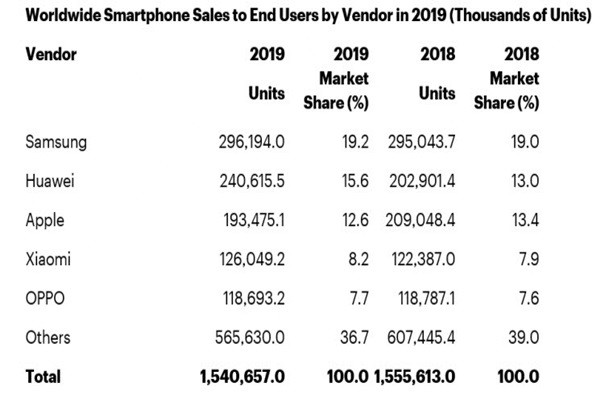It is heard that Samsung Electronics is looking to increase next year’s smartphone shipments to 300 million units as it is expecting to benefit from sanctions imposed by the federal government the U.S. despite the continuation of the COVID-19 pandemic. Huawei is the world’s second biggest smartphone manufacturer after Samsung Electronics and it has closed upon Samsung Electronics. It will be interesting to see whether Samsung Electronics will be able to prepare opportunities to rebound itself next year after suffering from lack of sales of the Galaxy S20 series and COVID-19 this year.
According to the industry, Samsung Electronics is looking into upping next year’s smartphone shipments to 300 million when it is estimating to sell about 260 million units this year. It is heard that the U.S. Government’s sanctions on Huawei are the main reason why Samsung Electronics is looking to increase next year’s smartphone shipments.
“Due to the U.S. Government’s sanctions on Huawei, Samsung Electronics is estimating that Huawei’s next year’s smartphone shipments will be reduced by about 70% compared to this year.” said a representative for the industry. “As a result, other Chinese smartphone manufacturers such as OPPO and VIVO are estimating a 30% boost to their sales while Samsung Electronics is expecting a 15% jump in its sales.”
According to a market research company called Gartner, the number of Huawei’s smartphone shipments in 2019 was 240.6 million units which was close second to Samsung Electronics’ smartphone shipments of 296.2 million units. As a result, Huawei was planning to compete for the title that Samsung Electronics is holding by increasing its sales volume to 300 million this year. Huawei, its plan has faced many setbacks as the U.S. Government has imposed many sanctions on Huawei due to reasons such as leaking of information, security, and trade conflict. Because one of the U.S. Government’s sanctions has really restricted Huawei from using semiconductors based on American technologies, Huawei was in a risk of not being able to manufacture smartphones at all.

It is not possible to manufacture smartphones without semiconductors such as application processor or DRAM and NAND flash memory. Because almost every semiconductor manufacturing process from design to production involves technologies from American companies, Huawei is being pushed towards the end of its rope. Although it is expected that Huawei is going to handle the current crisis with semiconductors that it had secured in advance, it is likely that Huawei will face a significant blow next year when it runs out of semiconductors in its inventory.
This is a great opportunity for Samsung Electronics’ smartphone business. According to a market research company Strategy Analytics, Samsung Electronics’ smartphone sales in the first half was 112.5 million units which was a 24% drop compared to last year. This drop was much greater than that of its competitors and it was mostly due to the lack of success of the Galaxy S20 series. Samsung Electronics is looking to rebound itself in the second half by launching its new Galaxy Note series and a foldable smartphone model one after the other. It is also expecting to benefit from sanctions on Huawei next year.
Current market climates are also favorable for Samsung Electronics. The U.S. Government’s additional sanction that blocks supplies of semiconductors to Huawei will be imposed in the middle of this month. Also, there are boycotts taking place in India, which is an emerging country for the global smartphone market, towards Chinese products. India is applying economic retaliation towards Chinese products after the two countries were involved in a border conflict.
“Although the future is still unknown, it seems like opportunities are being made again for South Korea’s smartphone industry.” said one representative from the industry.
Staff Reporter Yun, Geonil | benyun@etnews.com